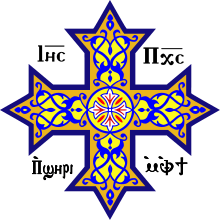Pope Zacharias of Alexandria
| Saint Zacharias of Alexandria | |
|---|---|
| 64th Pope of Alexandria & Patriarch of the See of St. Mark | |
| Papacy began | 1004 |
| Papacy ended | 22 November 1032 |
| Predecessor | Philotheus |
| Successor | Shenouda II |
| Personal details | |
| Born | Alexandria, Egypt |
| Died | 22 November 1032 |
| Buried | Church of the Holy Virgin (Babylon El-Darag) |
| Nationality | Egyptian |
| Denomination | Coptic Orthodox Christian |
| Residence | Saint Mark's Church |
| Sainthood | |
| Feast day | 22 November (13 Hathor in the Coptic Calendar) |
Pope Zacharias of Alexandria, 64th Pope of Alexandria & Patriarch of the See of St. Mark.
He was a native of Alexandria and was an ordained priest there. He was chaste and gentle in disposition.
When St. Philotheus, 63rd Pope, departed, the bishops assembled to choose, with God's guidance, the person who was fit to succeed him. While they were gathered in the church of St. Mark, discussing who was the most suitable man, they were informed that a rich man from Alexandria called Ibrahim Ben-Bishr, who was close to El-Khalifa (Governor) had given him a bribe and obtained a decree from him to be appointed Patriarch. El-Khalifa sent him, accompanied with some soldiers, to Alexandria. The bishops were saddened and they entreated God in one accord to keep away from His church the one who was coming to shepherd His church through bribery and the sultan's influence. They asked God to choose the person who was fit for this honor.
While they were on this subject, Abba Zacharias came down the stairs of the church carrying a vessel. His foot slipped and he fell and came tumbling down the stairs to the floor while still holding the unbroken vessel in his hand. The bishops and the priests marvelled at this, and they asked the opinion of the people of Alexandria. Everyone agreed on Abba Zacharias' righteousness and his knowledge. They all agreed, along with the bishops, to ordain him Patriarch.
When Ibrahim Ben-Bishr arrived, he found that they had already ordained Abba Zacharias as Patriarch. When the bishops read the King's letter, they appeased Ibrahim and ordained him priest, then hegumen. They promised to ordain him bishop when one of the dioceses became available. Abba Zacharias suffered many tribulations. On one occasion, a monk had made many accusations against him before El-Hakem (Be-Amr-Allah) who became El-Khalifa (Governor) in the year 989 A.D. El-Hakem seized the Pope and cast him to the lions, but they did not harm him. The Governor was angered with the keeper of the lions and thought that he had taken a bribe from the Pope. The Governor kept the lions for a period of time without food, then he slaughtered a sheep and smeared the clothes of the Patriarch with its blood. He then cast him a second time to the lions, but again, they did not harm him, for the Lord had domesticated them. The Governor marvelled and ordered that he be lifted up.
The Governor then cast him into prison for three months during which he threatened him with death and casting in fire if he did not forsake his Christian faith. The Patriarch was not afraid. The Governor tried again bribing him by promising to appoint him a judge with jurisdiction over all other judges but he was not impressed with these earthly ranks and did not hearken to the order of the Governor. Finally, because of the mediation of one of the princes, he released Zacharias.
Abba Zacharias went to the desert of Scete, and stayed there for nine years during which the people suffered great tribulations and experienced many troubles. Also, several churches were destroyed during that time.
Christ the Lord had compassion on His church and removed these tribulations from the people. He also turned the Governor away from his injustice. Subsequently, the Governor ordered the churches that were destroyed to be rebuilt. He also ordered that everything that was taken from them be returned and that the bells of the churches ring again.
Abba Zacharias lived 12 years, after his return from the desert, during which he took interest in building churches and restoring those that were destroyed. He remained in the papacy for 28 years and departed to the Lord in peace.
According to Abu al-Makarim, writing in the last quarter of the twelfth century, Zacharias was the last Patriarch of Alexandria to send letters to the rulers of Nubia and Ethiopia, having been forbidden to do so by the Fatimid Caliph Al-Hakim bi-Amr Allah. Nevertheless, if the Caliph or his vizier received a letter from either ruler, it remained the duty of the Patriarch to write a reply.[1]
Pope Zacharias was buried in Saint Mary Church (Babylon Al-Darag) in Coptic Cairo.
References
- ↑ B.T.A. Evetts (translator), The Churches and Monasteries of Egypt and Some Neighboring Countries attributed to Abu Salih, the Armenian, with added notes by Alfred J. Butler (Oxford, 1895), p. 290
| Preceded by Philotheos |
Coptic Pope 1004–1032 |
Succeeded by Shenouda II |
